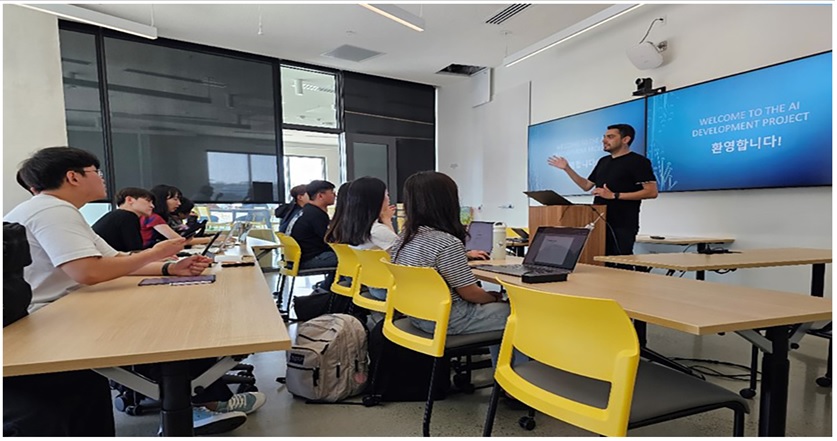
Keimyung University Collaborates with Qualcomm Research Institute in the United States and other Universities to Operate Global Convergence Capstone Design for AI Experts.
- Jointly Runs it with Qualcomm Institute and University of California San Diego in San Diego, USA
- Promises to Expand Collaboration in Cultivating Talent in the Fields of Artificial Intelligence, Future Mobility,
and Smart Cities.
Keimyung University, in collaboration with Qualcomm Institute in San Diego, USA, and the University of California San Diego, undertook a global convergence capstone design course from July 8th to August 13th (37 days) to cultivate AI experts as demanded by the local community and this era. In this course, a total of 11 students from three universities, including 6 from Keimyung University, 2 from Kumoh National Institute of Technology, and 3 from Andong National University, participated in four teams, successfully completing the 'QI Artificial Intelligence Development Project.
The students conducted an AI research project that involved collecting and analyzing various big data related to our daily lives and industries to predict future demands. Based on this work, they have written papers and are currently in the process of submitting it to the Korean Communication Society's Fall Academic Conference scheduled for November.
Team 1 conducted research on predicting shared bicycle demand based on artificial intelligence algorithms using weather data. They analyzed past data from Seoul's shared bicycle system, known as 'Ttareungi,' to propose a model for predicting shared bicycle demand based on weather conditions. To perform the analysis, they utilized artificial intelligence algorithms such as Multiple Linear Regression, Random Forest, and Multi-layer Perceptron to identify the algorithm that provided the highest predictive accuracy and confirmed a close correlation between weather and bicycle demand.
Team 2 conducted research on predicting hourly subway usage based on machine learning algorithms using weather data. They confirmed a significant relationship between weather and subway usage. They analyzed subway usage data from Euljiro 1-ga Station and Ttukseom Station in Seoul, along with weather data sets, using Multiple Linear Regression and Random Forest algorithms to predict the number of users by time of day based on weather conditions.
Team 3 extracted Matlab-based simulation data on the IEEE 13-bus industrial distribution system for the development of a machine learning algorithm-based electrical fault detection and classification analysis model. They extracted data from Line-to-Ground Fault (LG fault) data, which accounts for approximately 80% of faults in power systems, as well as current and voltage time series data, creating a total of four data sets.
Team 4 analyzed the UMAFall dataset, which includes various human behavior patterns, for research on a fall detection model using machine learning algorithms. The UMAFall dataset contains time series data for five common human actions and three falling actions, collected using acceleration sensors.
In this way, students learned about fundamental concepts and practical applications of AI, regardless of their majors, through various research topics and analyses. They gained knowledge in machine learning, deep learning, structuring extensive unstructured data, understanding and analyzing AI algorithms, comprehending and utilizing AI analysis platforms, and understanding and applying big data visualization. Moreover, despite being undergraduate students, they cultivated their research skills by documenting the results of their projects in research papers and preparing to present them at conferences.
Furthermore, students enhanced their practical understanding of the AI industry and global competency through visits to Qualcomm headquarters and the San Diego Supercomputer Center (SDSC) in the United States, as well as lectures and mentoring sessions by AI industry experts in the U.S., including Dr. Elimia Farcas from Qualcomm Research Institute, Mr. Han-Sol Hong, CEO of Robolink, and Mr. Seong-Hwan Cho, CTO of NanoCellect Biomedical.
Since 2016, Keimyung University has jointly planned 10 global education programs with Qualcomm Research Institute, with a total of 113 students participating in these programs. Until 2020, these programs included practical training components. However, starting in 2022, in response to the demands of the local community and the era for cultivating AI experts, the programs have been enhanced and operated as AI development projects. Furthermore, from this point forward, the university has expanded educational opportunities to include students from other local universities such as Andong National University, Kumoh National Institute of Technology, Kyungil University, and Kyungwoon University. This expansion solidifies the university's role as a hub for regional global programs and a recognized center for education in the field of AI.
Keimyung University fourth year student, Lee Yejin, majoring in Biomedical Engineering, shared her thoughts on the QI project stating, 'Through the QI project, I was able to enhance my skills in processing and analyzing big data through interactions with AI experts. Additionally, I found the motivation and opportunity to apply AI technology in my field. In particular, the experience of taking the initiative to choose a topic, collaborating with team members, encouraging each other, and working on the project for five weeks has given me the confidence that will serve as the driving force for future endevours.”
Dr Kim Beom Joon, the Vice President of Industry-Academia Cooperation at Keimyung University (Electronic Engineering Department), explained, 'Our university has already opened a campus in the Suseong Alpha City and is actively promoting the regional SW talent development project with the Daegu Digital Innovation Promotion Agency, contributing to the cultivation of global ABB talent in our region. Furthermore, we are making efforts to enhance students' global competencies in collaboration with world-renowned research institutions like Qualcomm Research Institute, and to expand their understanding of emerging industries in our region.
'In particular, we have expanded our collaboration not only with Qualcomm Research Institute but also with the University of California San Diego to redefine the direction of education for future global ABB talent development. We have also committed to expanding student education, collaborative research, and faculty exchange activities centered around not only artificial intelligence but also future mobility, smart cities, energy, the environment, healthy aging, and citizen safety.' he further emphasized.